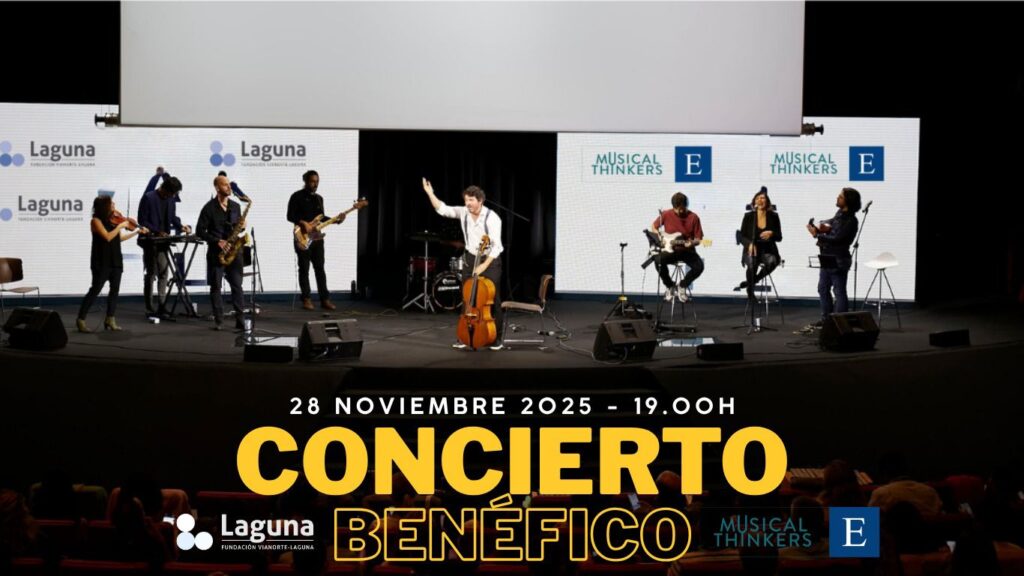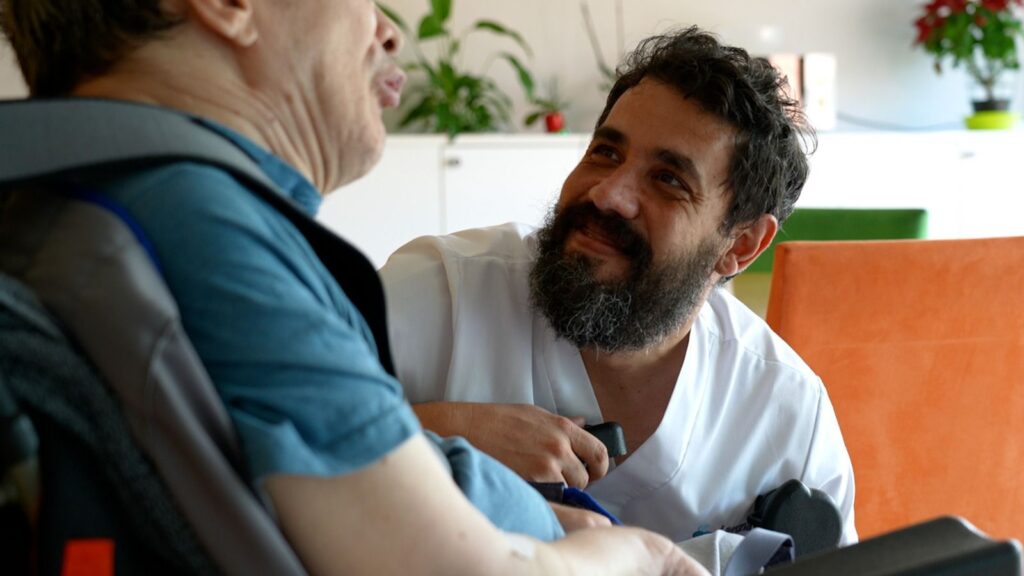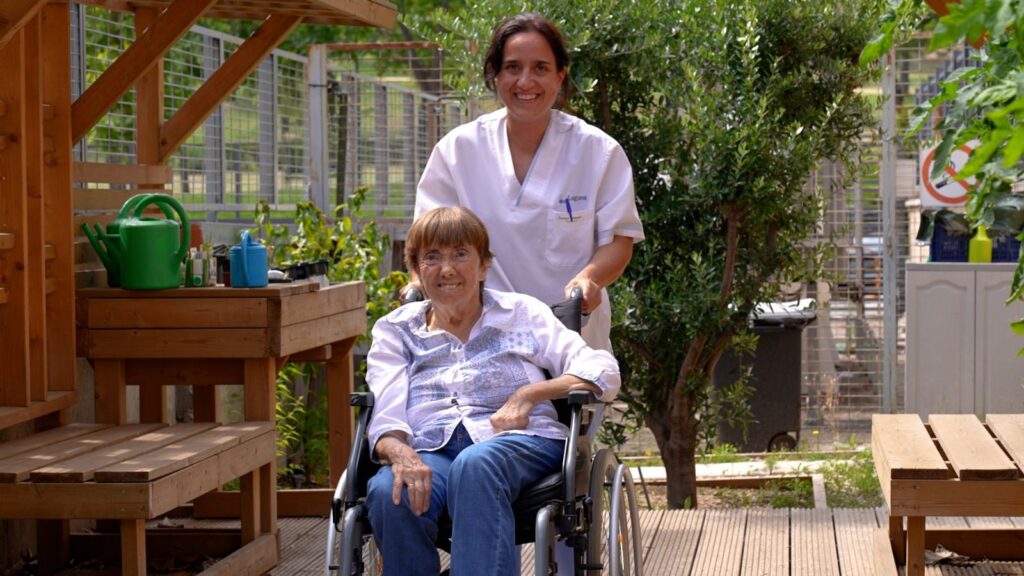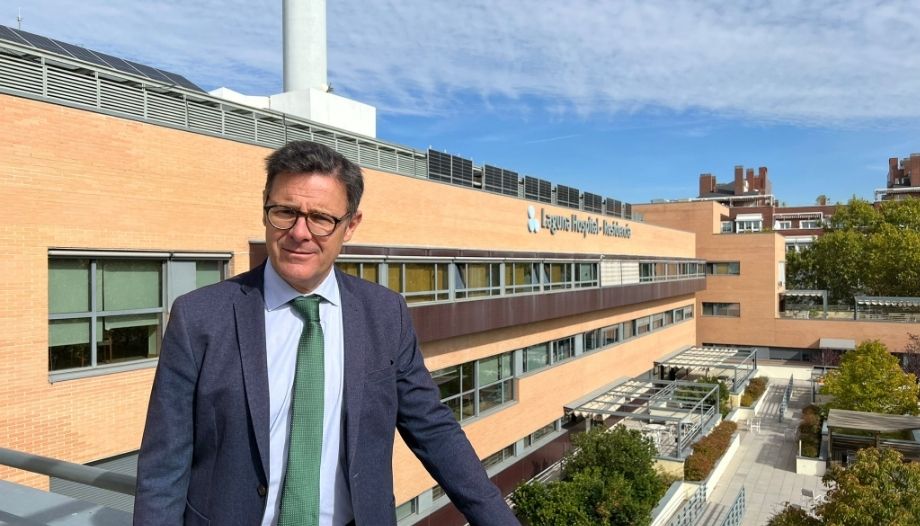The Laguna Care Hospital is one of the largest palliative care hospitals in Europe in terms of number of beds, and one of the first in Spain. It is specifically dedicated to the care and attention of elderly people in a situation of special fragility, or suffering from diseases with no hope of cure, and to the support of their families.
The Vianorte-Laguna Foundation, a non-profit organization, promoted the social and healthcare center in 2002. The general director of the Laguna Care Hospital, David Rodríguez-Rabadán, talked to Omnes about the social impact of advanced diseases such as Alzheimer's, Parkinson's, ALS, COPD, cancer, etc., on the hospital and families.
In Laguna, the waiting list is large, and they are thinking of “extending” their “care model”, reveals the general manager, “due to the great demand that exists”.
The concert: spreading the value of life at the end of life
At the moment, the Laguna Care Hospital has organized the benefit concert ‘Journey to the Center of Life’, in favor of Laguna Palliative Care, on November 28, in the Auditorium of Mutua Madrileña, with the help of Musical Thinkers.
The concert has two equally important motivations, David Rodríguez-Rabadán told Omnes. The first is “to spread the value of life at the end of life. And the second is ”to raise resources to help care for the weakest and most fragile. That is where we started the conversation.

Why this benefit concert of the Laguna Care Hospital on November 28th?
- They are two motivations, both equally important, at the same level. And when I say this, it is not an appeal. They are really two equally important motivations.
I would almost go so far as to say that the first is to spread the value of life at the end of life. Laguna has become a reference in the care of people for whom many would throw in the towel.
Because we may end up thinking that one life is more useful than others, that one life is worth more than others depending on what your body or mind can do. Or how long a doctor has estimated that you have left to live.
The value of the individual is immeasurable
At Laguna, the raison d'être of Laguna, based on the intrinsic value of the person, which is incalculable, everyone is cared for with all available means so that they may have a quality of life until the natural end of their days.
This commitment to life at the end of life is very beautiful, and it should fill our hearts and heads. To create a crusade of people, to make society in general aware of this wonderful mission, which is to care for the most fragile and for them to continue to feel valued.
It is an informative task that the concert also unites. Those who go to the concert know what they are going to, it is to support Laguna in its mission.
And the second motivation?
- And as a second motivation, there is indeed the attraction of resources, because a patient with these characteristics, as you can imagine, private insurers have no interest whatsoever. And the public hospitals, there is not much to do either, because we are talking about chronic patients, or palliative patients.
Then, when they come to Laguna, we do not skimp on means to take care of them. This sparing of means requires finding resources -personnel, means, investment- to be able to take good care of them.
We are a non-profit foundation, and everything that is raised is for the care of the weakest and most fragile.
But the one without the other would not be understood, and the other without the one, either.

I guess this connects with the founding idea of Laguna, with its genesis. Are you there from the beginning?
- No. I've been here for six years, and Laguna has been in existence for twenty years now. As a result of the centenary of St. Josemaría in 2002, there was a push to create an institution that would help people to die well, so that no one would feel a burden. To alleviate the burden on the families, to use all the professionalism that exists in chemical and healthcare advances to help those people who seem to be outside the system, so to speak, or who the system is not able to attend to them as they deserve. Because of their pluripathologies, or diseases, or because of the degree of advancement of their diseases.
You talk about care, when it is no longer possible to cure.
- Indeed, Laguna was created twenty-something years ago to care for those who cannot be cured. Laguna was created twenty-something years ago to care for those who cannot be cured. Curing is a wonderful job, but when medicine can no longer cure, then care must be provided. That is why Laguna is called Laguna Care Center, Laguna Care Hospital.
We can say that palliative care is the palliative care of the last days. The average length of stay at Laguna Hospital is 12 days. That is to say, Laguna is the last home for 200 people that we treat daily on an inpatient basis, right now 103 or 104 people. And we have another 90 in ambulatory home care. What they all have in common is that they are at a very critical stage of their lives, where medicine can no longer cure them, and what we have to do is to take care of them.
That was the genesis of Laguna. During these years, it is true that Laguna has been adapting. As a result, right now we have a very powerful cognitive care unit, complex geriatric patients with great weakness, great frailty, with quite complex clinical pictures, as I have said. And who also have Alzheimer's disease, cognitive impairment, in any of its stages.
¿How they are affected or impacted by diseases such as Alzheimer's disease?
- It's a bomb in today's society, and it's getting worse, Alzheimer's and cognitive impairment, Parkinson's, and others along these lines. It's also a bombshell for families. As in palliative care, attending to pre-bereavement and bereavement is fundamental, helping the patient and family to accept and make sense of this situation transcends clinical care, and is in Laguna's foundational DNA.
Well, in the Alzheimer's part, which may not have such an immediate end of life, it is an irreversible disease, and the family has a very important emotional imbalance when they have to face a loved one with Alzheimer's disease. Here we have such wonderful stories that leave you with a very heavy heart.
Integrating the family in care
There, Laguna has come to assist fragility and these complex situations, as part of its founding vision. It is true that he was not there at the beginning. We can call it long-term palliative care, prolonged palliative care, technically speaking. It is an attempt to provide quality of life in the clinical conditions of each person, attending to his or her conflictive situation.
And of course, integrating the family in all the care we do. Laguna in this case becomes one more member of the family. Our aspiration is to be one more in the family of each person we treat.
This is nice.
- Yes, it is.

Tell us about coping with cognitive decline. And what they call life history.
- I am going to tell you an anecdote. The other day we had an internal meeting, and the palliative team was talking about the life history of each patient.
We make a little book of each patient, based on what they have been, where they are from, their likes and hobbies. And we use this life history for three things: first, when they have behavioral disorders, we know what they can respond to, for example, to calm them down. If he likes to speak in French, we play him an audio in French, and suddenly he calms down and his aggressive behavior decreases. Or talk about his hometown, or anything in his life that he likes.
Second, because reminiscence (the process of remembering and recounting the past) activates neurons and parts of the brain, and helps that person have conversations, interact, and be happy remembering what he or she likes.
Let's go with the third one.
- And the third is because behind that person, who sometimes does not even know his name, there is a dignity, there is a history, and he continues to be that person who has done everything during his life. Here we have patients who are writers, doctors, a professor of Exact Sciences, who continues to be, and has been that.
The people who take care of them here, in a proactive way, when they address the patients, they don't just address a patient, they address the greatness that person has had in his life, and they enhance all his potential, even though he is now with Alzheimer's and with very limited cognitive abilities. I thought it was very nice to break the rules and look beyond, to fill us with the life of each person.
Earlier you spoke of an average stay of twelve days. Could it be the case that the care could result in a lengthening of the stay, or even a reversal, or a slower deterioration?
- I will answer with data. One can understand life from three dimensions, one is explainable and the other two are not explainable. The explicable one is everything that reason can explain, some clinical treatments, etc. Then there is an affective dimension, falling in love, to give an example, and then a transcendent, spiritual one.
Explainable. I have not seen Laguna's level of professionalism anywhere. As for the other factors. Within the critical conditions of each patient, care translates into quality of life. The relatives of the patients we have are the first to be surprised by the evolution in the sense that you are talking about in the question.
The reality is that between what medicine explains and what that inexplicable, affective dimension explains, complex chronic patients have a quality of life that can only be explained by affection, by feeling cared for. That they are not a hindrance to anyone, that they are cared for because of their value. This does not happen in an isolated case, it is the generality in Laguna.
Can you meet all requests?
- Who was Laguna created for? Let's imagine three circles stepping on each other. The first circle is advanced diseases, such as Parkinson's or Alzheimer's, cancer, ALS, COPD, and so on.
The second circle is dependency, for example, a person who is totally dependent for his or her day-to-day life.
The third circle is frailty. A patient with pulmonary fibrosis, for example, for whom constipation can be severe.
Laguna was created in the first instance for patients with the confluence of the three factors. And from there we begin to graduate the conjunctions of the three circles, the severity of each patient... We say no to many patients, because the beds are limited. The waiting list is long. Earlier we talked about beds and outpatients or home patients.

Perhaps they have an expansion on the horizon, although it is not the subject of this conversation....
- I would not mind saying that we are eager to open another center because of the great demand, and because of our mission to bring this care to everyone, perhaps in the north of Madrid, supporting other initiatives. Laguna is eager to extend our model of care.
One last comment on the Concert.
- I would encourage people to go to the concert for the reasons we have discussed initially. It is going to be wonderful. I would love for there to be a full house, we have already sold half of the tickets, people will enjoy in communion with other attendees, with the public, in something so beautiful, and they will have a great time. In addition, there will be a cocktail.
The Auditorium of Mutua Madrileña (P.º de Eduardo Dato, 20, Madrid, 19.00 h.), is the venue chosen for the Concert of the Laguna Care Hospital. To get tickets and to support, you can click on here.








